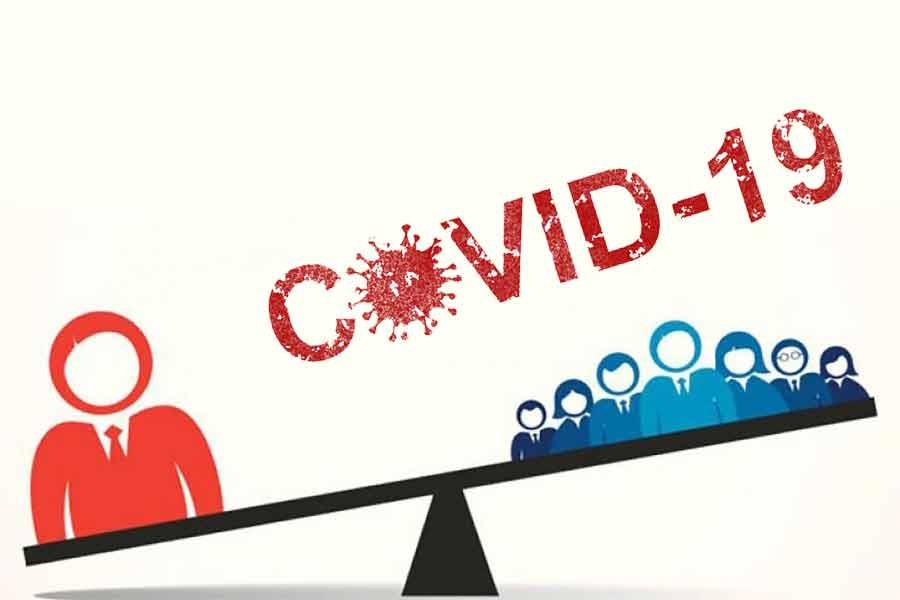Statements that at times appeal to us as quite apt may prove to be not only inappropriate but thoroughly untrue. When the Covid 19 began its onslaught a couple of years ago, sparing none-- rich or poor, it seemed to many as if it were a God-sent equaliser. US rock star Madonna said the pandemic proved to be the 'great equaliser', adding 'the global population is on the same boat'. Government leaders, too, took fancy to say 'we're in this together'.
That the pandemic has spared none apparently reflects a sense of indiscrimination ('equality' one could say), but what is more to it is not its own making. It's manmade. And it is discrimination -- divides of various stripes -- drawing lines across societies that many of us did not care to notice at the beginning. In many parts of the world it was racism that having been released as though from its veiled state became almost invasive. Money and power being the key fundamentals not only kept societies away from one another, even societies not at all prosperous but apparently homogeneous (say, those in the developing world) did demonstrate signs of disintegration as one or more social segments looked for security at the expense of many more. Studies have shown that most human activities had the harsh knock of segregation. In fact, it is difficult to tell which are the areas not dented by the discrimination. The pandemic stoked it up, but it is mostly our selfish instinct that made the most of it in drawing the lines.
Covid-19 has brought home at least one thing. While it has bared the inadequacy and utter unpreparedness of healthcare systems across the globe, even in advanced countries, to stop people dying on an unprecedented scale, the arrogance of some governments at the start has also added to fuel the pandemic and also to the eventual fallout of inequality in various spheres.
The boat rhetoric gained popularity drawing media attention just because Madonna is famous with a massive social media following. But the hypocrisy underlying the empty rhetoric was easy to see.
Are we, really 'on the same boat', or are we 'all in this together?' With unemployment rates skyrocketing across the globe, hundreds of millions struggling to feed their children, multitudes of hapless families in desperate need of healthcare, one cannot make such outrageous claim.
Not only are we not 'on the same boat', but certainly, we have never been. According to World Bank data, nearly half of the world lives on less than $5.5 a day. This dismal statistics is part of a remarkable trajectory of inequality that has afflicted humanity for a long time.
The plight of many of the world's poor is further compounded by their condemnation to war refugees, the double victims of state terrorism and violence and the unwillingness of those with resources to step forward with some of their largely undeserved wealth.
At the recently held 12th WTO ministerial meeting in Geneva, it became starkly evident that cashing in on Covid vaccine divide was a clear objective that prompted advanced countries not to agree on a TRIPs waiver that otherwise would have helped millions of people in the developing world fight the global pandemic. Proposal for a meaningful intellectual property waiver for vaccines was watered down by the rich countries including the EU, UK and Switzerland.
The Covid-19 has accentuated and, in fact, accelerated the sharp inequalities that exist in every society individually, and the world at large. According to a study conducted in the United States by the Brookings Institute, the number of deaths as a result of the disease reflects a clear racial logic. Many indicators included in the study leave no doubt that racism is a central factor in the life cycle of Covid. For example, among those aged between 45 and 54 years, "Black and Hispanic/Latino death rates are at least six times higher than for whites". Although whites make up 62 per cent of the US population of that specific age group, only 22 per cent of the total deaths were white.
According to this and other studies, the main assumption behind the discrepancy of infection and death rates resulting from Covid among various racial groups in advanced countries is poverty which by itself is an expression of inequality. Moreover, poor communities in all countries tend to work in low-paying jobs in the service sector, where social distancing is nearly impossible. With little government support to help them survive the lockdowns, they did everything within their power to provide for their children, only to be infected by the virus, or worse, die.
Now that the pandemic has eased to a large extent -- cases of infection still prevalent though -- and life has started to kick off, the divide is more apparent. This divide is not a two-dimensional divider, but a multifaceted one cutting across societies affecting human behaviour, social norms and practices. The basic social necessity and human instinct that shape the human race through numerous activities at home and outdoors have suffered setbacks, and the changes are yet to be fully visible.
While it is likely that class, race and gender inequalities will continue to ravage human societies after the pandemic, as they did before, bridging the inequality gap sounds like a rhetoric but at least keeping this malady in mind may awaken the human spirit in favour of a better understanding of each other.


